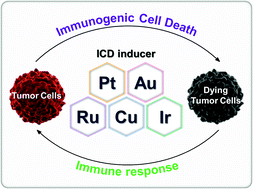Metal-based anticancer agents as immunogenic cell death inducers: the past, present, and future
Abstract
Cancer is the deadliest disease in the world behind heart disease. Sadly, this remains true even as we suffer the ravages of the Covid-19 pandemic. Whilst current chemo- and radiotherapeutic treatment strategies have significantly improved the patient survival rate, disease reoccurrence continues to pose a deadly risk for all too many patients. Incomplete removal of tumour cells from the body increases the chances of metastasis and developing resistance against current treatments. Immunotherapy represents a therapeutic modality that has helped to overcome these limitations in recent decades. However, further progress is needed. So-called immunogenic cell death (ICD) is a recently discovered and unique mode of cell death that could trigger this necessary further progress. ICD involves stimulation of a tumour-specific immune response as a downstream effect. Facilitated by certain treatment modalities, cells undergoing ICD can trigger the IFN-γ mediated immune response involving cytotoxic T cells (CTLs) and γδ T cells that eradicate residual tumour cells. In recent years, there has been a significant increase in the number of small-molecules being tested as potential ICD inducers. A large number of these ICD inducers are metal-based complexes. In fact, anticancer metal drugs based on Pt, Ru, Ir, Cu, and Au are now known to give rise to an immune response against tumour cells as the result of ICD. Advances have also been made in terms of exploiting combinatorial and delivery strategies. In favourable cases, these approaches have been shown to increase the efficacy of otherwise ICD “silent” metal complexes. Taken in concert, rationally designed novel anticancer metal complexes that can act as ICD inducers show promise as potential new immunotherapies for neoplastic disease. This Tutorial Review will allow the readers to assess the progress in this fast-evolving field thus setting the stage for future advances.



 Please wait while we load your content...
Please wait while we load your content...